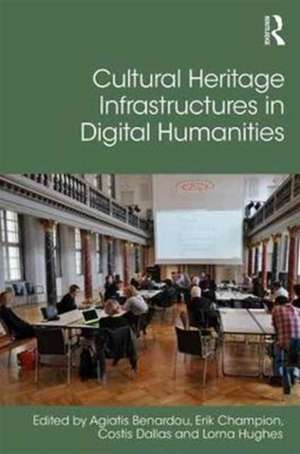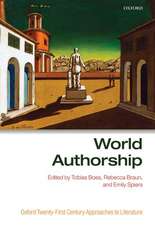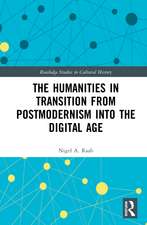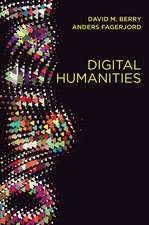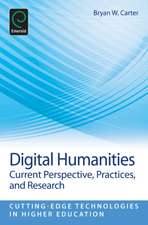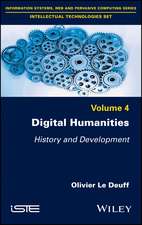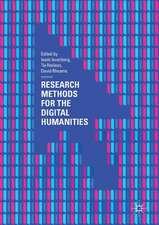Cultural Heritage Infrastructures in Digital Humanities: Digital Research in the Arts and Humanities
Editat de Agiatis Benardou, Erik Champion, Costis Dallas, Lorna Hughesen Limba Engleză Hardback – 2 oct 2017
| Toate formatele și edițiile | Preț | Express |
|---|---|---|
| Paperback (1) | 383.24 lei 6-8 săpt. | |
| Taylor & Francis – 12 dec 2019 | 383.24 lei 6-8 săpt. | |
| Hardback (1) | 999.12 lei 6-8 săpt. | |
| Taylor & Francis – 2 oct 2017 | 999.12 lei 6-8 săpt. |
Din seria Digital Research in the Arts and Humanities
-
 Preț: 311.33 lei
Preț: 311.33 lei -
 Preț: 312.09 lei
Preț: 312.09 lei - 20%
 Preț: 946.37 lei
Preț: 946.37 lei -
 Preț: 324.93 lei
Preț: 324.93 lei - 9%
 Preț: 935.99 lei
Preț: 935.99 lei - 20%
 Preț: 247.23 lei
Preț: 247.23 lei -
 Preț: 311.28 lei
Preț: 311.28 lei -
 Preț: 281.45 lei
Preț: 281.45 lei -
 Preț: 312.36 lei
Preț: 312.36 lei - 13%
 Preț: 338.33 lei
Preț: 338.33 lei - 26%
 Preț: 766.31 lei
Preț: 766.31 lei - 18%
 Preț: 1000.27 lei
Preț: 1000.27 lei - 16%
 Preț: 335.37 lei
Preț: 335.37 lei -
 Preț: 460.69 lei
Preț: 460.69 lei - 18%
 Preț: 1003.64 lei
Preț: 1003.64 lei - 22%
 Preț: 324.16 lei
Preț: 324.16 lei - 31%
 Preț: 764.20 lei
Preț: 764.20 lei -
 Preț: 386.77 lei
Preț: 386.77 lei - 20%
 Preț: 1053.91 lei
Preț: 1053.91 lei -
 Preț: 389.38 lei
Preț: 389.38 lei - 26%
 Preț: 819.90 lei
Preț: 819.90 lei -
 Preț: 422.89 lei
Preț: 422.89 lei - 16%
 Preț: 339.10 lei
Preț: 339.10 lei -
 Preț: 389.38 lei
Preț: 389.38 lei -
 Preț: 383.24 lei
Preț: 383.24 lei - 13%
 Preț: 337.84 lei
Preț: 337.84 lei - 16%
 Preț: 311.31 lei
Preț: 311.31 lei -
 Preț: 489.26 lei
Preț: 489.26 lei -
 Preț: 469.34 lei
Preț: 469.34 lei - 18%
 Preț: 1004.55 lei
Preț: 1004.55 lei - 18%
 Preț: 1005.67 lei
Preț: 1005.67 lei - 18%
 Preț: 999.46 lei
Preț: 999.46 lei - 18%
 Preț: 1000.27 lei
Preț: 1000.27 lei -
 Preț: 489.26 lei
Preț: 489.26 lei - 18%
 Preț: 1000.27 lei
Preț: 1000.27 lei - 18%
 Preț: 1058.65 lei
Preț: 1058.65 lei - 18%
 Preț: 1000.27 lei
Preț: 1000.27 lei - 13%
 Preț: 338.33 lei
Preț: 338.33 lei - 30%
 Preț: 878.82 lei
Preț: 878.82 lei - 26%
 Preț: 764.20 lei
Preț: 764.20 lei
Preț: 999.12 lei
Preț vechi: 1218.44 lei
-18% Nou
Puncte Express: 1499
Preț estimativ în valută:
191.19€ • 200.53$ • 159.16£
191.19€ • 200.53$ • 159.16£
Carte tipărită la comandă
Livrare economică 01-15 aprilie
Preluare comenzi: 021 569.72.76
Specificații
ISBN-13: 9781472447128
ISBN-10: 1472447123
Pagini: 190
Ilustrații: 6
Dimensiuni: 156 x 234 x 17 mm
Greutate: 0.42 kg
Ediția:1
Editura: Taylor & Francis
Colecția Routledge
Seria Digital Research in the Arts and Humanities
Locul publicării:Oxford, United Kingdom
ISBN-10: 1472447123
Pagini: 190
Ilustrații: 6
Dimensiuni: 156 x 234 x 17 mm
Greutate: 0.42 kg
Ediția:1
Editura: Taylor & Francis
Colecția Routledge
Seria Digital Research in the Arts and Humanities
Locul publicării:Oxford, United Kingdom
Public țintă
PostgraduateCuprins
1. Introduction, Agiatis Benardou, Erik Champion, Costis Dallas and Lorna Hughes 2. The Role of 3D Models in Virtual Heritage Infrastructures, Erik Champion 3. Internet Archaeology and Digital Scholarly Communication, Julian D. Richards 4. Crowds for Clouds: Recent Trends in Humanities Research Infrastructures, Tobias Blanke, Conny Kristel and Laurent Romary 5. The Ethnography of Infrastructures: Digital Humanities and Cultural Anthropology, Gertraud Koch 6. Building Personal Research Collections in Art History, Christina Kamposiori, Claire Warwick and Simon Mahony 7. Making sure the data fit the researchers. Data Identification and Investigation in European Holocaust Research Infrastructure (EHRI), Veerle Vanden Daelen 8. Mubil: A Library-based Immersive Virtual Environment for Situated Historical Learning, Alexandra Angeletaki and Marcello Carrozzino 9. Digital Heritage Tools in Ireland - a Review, Sharon Webb and Aileen O’Carroll 10. From Europeana Cloud to Europeana Research: Tools, Users and Methods, Agiatis Benardou and Alastair Dunning 11. Digital humanities research needs from cultural heritage looking forward to 2025?, Seamus Ross
Notă biografică
Agiatis Benardou is a Senior Research Associate at the Digital Curation Unit, Athena Research Centre, Greece, and a Teaching Fellow in Digital Curation at Panteion University of Social and Political Sciences.
Erik Champion is UNESCO Chair of Cultural Heritage and Visualisation at Curtin University, a steering committee member of the Curtin Institute for Computation (CIC), and a member of the Australia Asia Pacific Institute (AAPI).
Costis Dallas is Director of the Collaborative Programs and Associate Professor at the Faculty of Information at the University of Toronto, Canada, and a Research Fellow at the Digital Curation Unit, IMIS, Athena Research Centre, Greece.
Lorna M. Hughes is Professor in Digital Humanities at the University of Glasgow.
Erik Champion is UNESCO Chair of Cultural Heritage and Visualisation at Curtin University, a steering committee member of the Curtin Institute for Computation (CIC), and a member of the Australia Asia Pacific Institute (AAPI).
Costis Dallas is Director of the Collaborative Programs and Associate Professor at the Faculty of Information at the University of Toronto, Canada, and a Research Fellow at the Digital Curation Unit, IMIS, Athena Research Centre, Greece.
Lorna M. Hughes is Professor in Digital Humanities at the University of Glasgow.
Recenzii
"In Cultural Heritage Infrastructures in Digital Humanities, editors Agiatis Benardou, Erik Champion, Costis Dallas and Lorna M. Hughes offer a volume that examines the impact that emergent digital research infrastructures in the humanities have had on the academy and the wider public. Anyone concerned with the future of digital humanities research will find much to ponder in this timely and important collection of essays."
- Peter Webster, LSE Review
- Peter Webster, LSE Review
Descriere
What are the leading tools and archives in digital cultural heritage? How can they be integrated into research infrastructures to better serve their intended audiences? In this book authors from a wide range of countries, representing some of the best research projects in digital humanities related to cultural heritage discuss their latest findings, both in terms of new tools and archives, and how they are used (or not used) by both specialists and by the general public.
